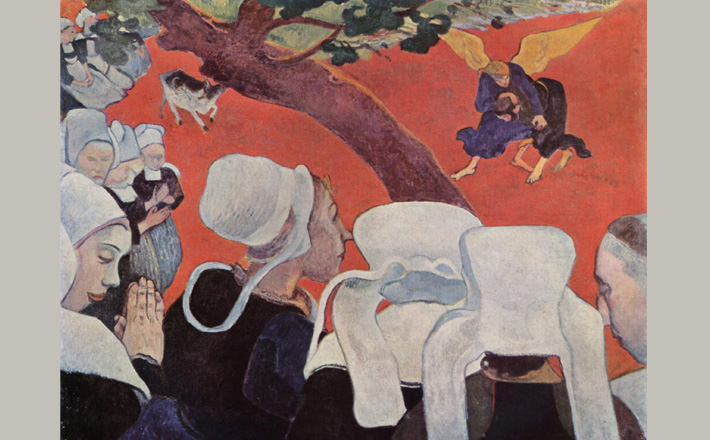Commentary on Jeremiah 31:27-34
Jeremiah starts this passage on a hopeful note.
In 29:11, he has promised us a “future of hope.” This is the lens through which Jeremiah sees the world. In spite of the many difficulties that the Israelites face, he rings the same note at the start of this passage. In verse 27, he envisions a future in which both Judah and Israel will be repopulated with human and livestock. The northern kingdom of Israel had been vanquished nearly 150 years, but Jeremiah still holds out hope for its restoration. Jeremiah’s inclusion of Israel highlights the fierceness of his hope. Many may have forgotten Israel by this time, but Jeremiah will not forget.
As we move into verses 28-29, Jeremiah acknowledges the pain of the contemporary situation. It cannot be overlooked. He reiterates a theme that he mentioned in his opening chapter. Part of Jeremiah’s call was to announce the Lord’s plucking up and pulling down (1:10). Just as Jeremiah stays true to his hopeful vision, he also stays true to his initial call from the Lord. These two moods within Jeremiah are not always easily reconciled. Perhaps we can best understand this passage and Jeremiah after considering another biblical prophet.
Jeremiah resembles the prophet Hosea in some important ways. There is an inevitability and a certain tragedy to both of their lives. Hosea would marry a prostitute and be bound to this relationship. Jeremiah must announce the plucking up and pulling down. This does not make Jeremiah many friends. We will see his king and many from his country turn on him. These two figures endure much pain, but they constantly return to the love of God. The heart represents this love. The word “heart” comes up repeatedly in both books, but especially in Jeremiah. The love of God is at the center of this pericope.
Jeremiah grapples with God’s love of a disobedient people. The disobedience to the Sinai covenant forged many centuries in the past has led to the current hardships. The first half of the book (Jeremiah 1-25) describes the collapse of Judah and is largely an indictment of it. Jeremiah offers us an orderly universe in which the disobedient are punished and justice is maintained. He denounces false hope and describes the ruin or “cup of wrath” that will be visited upon Judah. Once false hope has been denounced, Jeremiah can focus on the true hope that awaits God’s people in Babylon. This true hope takes a number of forms, but one of its most fundamental truths comes into shape in this pericope.
As Christ will do many centuries later, Jeremiah attacks the notion of communal guilt. Verse 29 makes it clear that children will not be punished for the sins of their parents. No one’s destiny is inevitable. Each person’s actions play a role in their salvation. This pericope announces a reversal of so much negativity that has held the Israelites bound. We get a sense that the “plucking up, destroying, overthrow, and bringing evil” of verse 28 is all part of this former understanding of collective guilt that Jeremiah rails against. The children should not be blamed for all these things of the past.
In the future just as God will watch over building and planting, God will also watch over a time when “all shall die for their own sins.” Jeremiah announces a freedom that takes us right back to the Garden of Eden. Everyone can make the same choice as Adam and Eve to eat from the tree of the knowledge of good and evil or not. We find here a reversal of the downward spiral of sin initiated in the primeval history of Genesis.
Commentators have noted the eschatological nature of the renewal found in the new covenant of verses 31-34. This eschatology can easily be seen as conditioned by the goodness of creation found at the beginning of Genesis. Protology is eschatology and eschatology is protology. Earlier in this chapter, Jeremiah has announced that God “has created a new thing on the earth” (Jeremiah 31:22). Now we hear of a new covenant in verse 31. The Bible invokes the theme of newness repeatedly in another important eschatological book: Revelation (see 21:1, 2, 5). Jeremiah invokes God’s goodness to Israel in the exodus from Egypt, but not even this goodness is enough to understand what God will do. We can easily imagine this new covenant initiating a new beginning like after the flood and Noah’s ark.
God had previously gifted Israel with the grace of the law. In spite of the controversies with the Pharisees in the New Testament, we must always remember what a gift this law was. Previously, this law was mediated through Moses and inscribed on stone tablets by God (Exodus 34:2). So as precious as this was, it was always something external to God’s people. Now we see renewal and restoration in this pericope as the law will no longer remain something external, but it will be inscribed on the hearts of God’s people. It will be completely internalized. Verse 34 confirms the radicalism of this as God now seems equally present to all Israelites from greatest to least. As important as priest, prophet, and king are to Israel, God’s people can survive without the institutions of Jerusalem in Babylon.
Our gospel this Sunday serves to further elucidate Jeremiah 31:27-34 as we hear about the persistent widow. The heart of this parable concerns a widow who refuses to give up her vision of justice. The odds may seem insurmountable as corruption, inhumanity, and impiety characterize the widow’s world. Yet, the widow would seem to be the perfect exemplar of someone with the law inscribed on her heart. Justice is completely internalized, and no amount of corruption can change the expectations and inner workings of this widow.


October 20, 2013